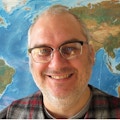Michael J. Follows, Ph.D.
Director, CBIOMESProfessor, Department of Earth, Atmospheric and Planetary Sciences, Massachusetts Institute of TechnologyMichael J. Follows’s website

CBIOMES Project: Computational biogeochemical modeling of marine ecosystems
We seek to characterize and interpreting the functional, trait and taxonomic biogeography of phytoplankton in the global ocean, and to mechanistically interpret and simulate the elemental composition of particulate in the surface ocean. In collaboration with our CBIOMES colleagues we are working to do the following: (1) inter-calibrate measures of phytoplankton abundance from diverse data sources and modeling frameworks; (2) exploit existing and emerging data sets to measure the skill of numerical simulations of diverse marine phytoplankton; and (3) develop and apply a new framework for simulating populations of marine plankton which resolves macro-molecular allocation and its relationship to physiological state and local environment. The latter will provide a key aspect for dynamic, mechanistic models to simulate, interpret and predict the elemental composition of marine particulate in space and time. This, in turn, modulates the storage of carbon in the ocean and atmospheric CO2.
SCOPE-ALOHA Project: Interpreting the Organization of Microbial Communities in the North Pacific Using Theory and Numerical Simulations
Natural microbial populations can appear bewilderingly complex, with assemblages of organisms spanning many orders of magnitude in size, diverse biochemical functionality, and extremely rich genetic variation. In any system we seek to understand which actors are present, which are absent, and why? What are the consequences for the ecosystem function and the flow of elements in that environment? Idealized theory and numerical simulations provide a means to synthesize and organize understanding of the pressures that shape microbial systems. They help frame hypotheses that can be tested in the laboratory and field.
In this collaborative effort we will employ data, theory and numerical simulations to test the hypothesis that the large-scale horizontal and vertical structures of the microbial communities of North Pacific Subtropical Gyre reflect a system close to equilibrium, organized by resource supply ratios. We will develop new, quantitative descriptions of the costs and benefits to the individual of specific functionality, including nitrogen fixation, and of both competition and cooperation between diverse microbes. Basin-scale numerical simulations the circulation, chemistry and ecosystem of the North Pacific will provide a means to illustrate and explore the large-scale consequences of these small-scale interactions.
SCOPE-Gradients Project:
We seek to understand and interpret the factors that control the large-scale biogeography and biogeochemical function of marine microbes; in particular the primary producers. Our goal as part of the SCOPE-Gradients project is to provide testable hypotheses, based on theory and numerical simulations, to shape the sampling effort, along with post-cruise analysis and interpretation. Two key aims are (a) to develop and test theories and models to explain changes in phytoplankton populations along environmental gradients and (b) to understand and develop mechanistic models for the elemental and macromolecular composition of microbial communities across environmental gradients. It is exciting to integrate these theory and modeling activities closely with the design, execution and analysis of the field observations.
Bio:
Michael Follows is a professor in the Department of Earth, Atmospheric and Planetary Sciences at the Massachusetts Institute of Technology (MIT). He seeks to understand how physical, chemical and biological processes modulate the structure and function of marine microbial communities and regulate the global cycles of carbon and other elements in the ocean. To this end, he uses idealized theory, numerical models and the analysis of observed data.